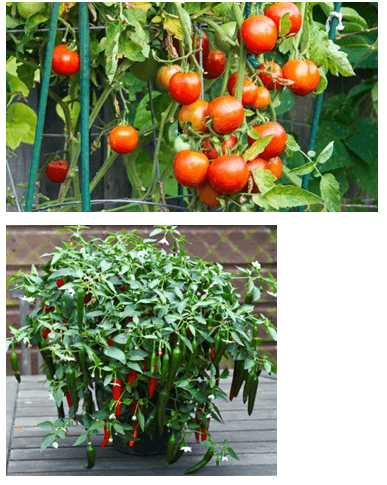
Off Season Cropping Techniques
Off season cultivation refers to the production outside of their typical cropping cycle.
The main objective of off season cultivation is to produce and supply to the market during their lean period.
Importance/Advantages of off season cropping
- It helps in the more effective and efficient use of land and farm resources.
- The per-unit result of off-season planting is excellent.
- Consumers nowadays prefer fresh veggies even when they are not in season, and off-season vegetable cultivation can meet this need.
- It is sometimes feasible to gain foreign exchange by exporting fresh veggies.
- It is a great source of preventive food that also contributes to nutritional security.
- It's a good choice for seed production.
Technologies For Off Season Cropping
- Drip irrigation
Crop yields can increase through improved water and fertility management and reduced disease and weed pressure. When drip irrigation is used with polyethylene mulch, yields can increase even further.
These benefits are only possible when a drip irrigation system is properly designed, managed, and maintained.
Advantages of drip irrigation
- Lower-volume water sources can be used because trickle irrigation may require less than half of the water needed for sprinkler irrigation.
- Lower operating pressures mean reduced energy costs for pumping.
- High levels of water-use efficiency are achieved because plants can be supplied with more precise amounts of water.
- Disease pressure may be less because plant foliage remains dry.
- Labor and operating costs are generally less, and extensive automation is possible.
- Water applications are made directly to the plant root zone. No applications are made between rows or other nonproductive areas, resulting in better weed control and significant water savings.
- Field operations, such as harvesting, can continue during irrigation because the areas between rows remain dry.
- Fertilizers can be applied efficiently through the drip system.
- Irrigation can be done under a wide range of field conditions.
- Compared to sprinkler irrigation, soil erosion and nutrient leaching can be reduced.
- Container gardening
The following crops best suited for container/pot gardening;- Beans
- Beets
- Tomatoes
- Cucumber
- Onions
- Peas
- Radish
- Carrots
- Potatoes
- Squach
- Brinjal(Eggplant)
- Ladies Finger (okra)
- Capsicum/Pepper/ Green Chilies
- Leafy vegetables such as lettuce, Kale, Methi(Fenugreek), Coriander (cilantro)

Factors to consider when establishing framed suspended gardening for off season crops
- Can it be established along pathways
- Can it enhance beauty
- Can it grow within a short period of time (not a perennial crop)?
- Is there space for the containers
- Mechanisms put in place to manage pests and diseases.
Off Season Production Techniques
- Taking use of and utilizing various agro-climatic conditions.
- Improved varieties are chosen.
- Adjustment of planting time.
- Making plastic tunnels, polythene houses, and permanent glass houses to provide controlled environmental conditions.
- Staggered planting
- Succession planting – planting two different at different times in one farm- one with a faster maturity.
Construction of suspended garden design
Refer to learner’s book

Value Addition Techniques
Value-added agriculture generally focuses on production or manufacturing processes, marketing or services that increase the value of primary agricultural commodities, perhaps by increasing appeal to the consumer and the consumer's willingness to pay a premium over similar but undifferentiated products.
Benefits include:
- increased income,
- employment creation,
- improved food safety,
- food security,
- nutritional benefits and
- greater consumer confidence.
There are four major ways that value is added to crops along the value chain:
- product transformation, e.g. frying, drying
- distribution,
- storage, and
- added service.
The value of farm products can be increased by cleaning, cooling, cooking, combining, churning, culturing, grinding, extracting, drying, handcrafting, packaging and distributing, as well as by adding information, education or entertainment,
Adding value to groundnuts
Apart from just eating them raw or cooked, groundnuts can be used to produce oil, paste, flour or sauce used in cakes and cookies obtained by grinding nuts, and peanut butter.
Adding value to Potatoes
This can be done through boiling, frying, smashing.
Learners to check on how to add value on other products
Importance Of Addition On Crop Produce (explained)
- Increased revenue. Any addition adds a percentage of increased financial value to the produce and has the effect of improving the incomes of the local farmers.
- Value addition allows the farmer to focus on the consumer while producing and through meeting expectations, he can create a loyal market around the product.
- Increased shelf life is a benefit any farmer would want. The longer the product can stay without getting spoilt, the more the guarantee one has of a product selling at their preferred price and time. Milk for instance, hardly lasts over 24 hours but with boiling, it can last more days while with further processing into ghee, the same milk can last months.
- With value addition comes increased bargaining power. Brand Creation is one of the de facto results of value addition and a fact that your product can be directly identified with you or your farm which is important in an industry where customers exercise a lot of brand loyalty. It allows them to always and readily identify with you as well as win you more referral customers.
- value addition creates employment opportunities for people who work there like; industrial chemists, food processors, factory laborers
- Wastage and disposal of unwanted refuse is curtailed since they can be made into different quality products. This helps to ensure zero waste and protect the environment.
Download Agriculture and Technology - Grade 7 Agriculture Revision Notes.
Tap Here to Download for 30/-
Get on WhatsApp for 30/-
Why download?
- ✔ To read offline at any time.
- ✔ To Print at your convenience
- ✔ Share Easily with Friends / Students

